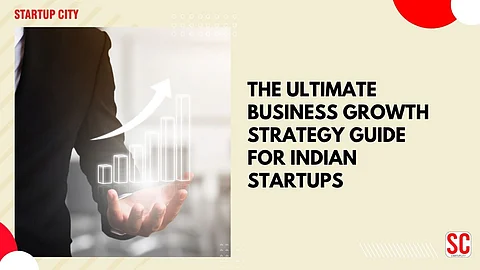

Business Growth Strategy Guide
Imagine this… You’ve launched your startup, the product is out, the team is excited, and your first customers are starting to trickle in. But then comes the big question every founder eventually faces:
“How do I scale this into a sustainable, fast-growing business?”
If you're a startup founder in India, you're not alone. I've worked with, interviewed, and learned from hundreds of entrepreneurs across the country, and one thing is clear—growth doesn't just happen; it's engineered.
In this guide, I’m going to break down the ultimate business growth strategy playbook specifically tailored for Indian startups, keeping in mind the unique challenges, opportunities, and dynamics of our market.
Let me be blunt. Great products don’t always guarantee great businesses. A solid business growth strategy is what turns early wins into long-term success.
Whether you're in SaaS, D2C, edtech, fintech, or services — if you don’t have a repeatable, scalable system for growth, your startup may stagnate while others soar past you.
So, what does a winning growth strategy look like for Indian startups?
Let’s dive in.
Growth isn’t one-size-fits-all. For one startup, it's user acquisition. For another, it's revenue, funding, or profitability.
Do I want to grow fast or grow sustainably?
Am I chasing revenue, profit, market share, or user base?
What does “10x” mean in the context of my business?
Clarity fuels momentum. The more specific your goals, the easier it becomes to align your strategy with them.
“If you don’t know where you’re going, any road will get you there.”
— Lewis Carroll
Your product is important, but your business model is your growth engine.
High margins (more cash to reinvest)
Repeat customers (reduces CAC)
Automation-friendly operations
Low dependency on founders (so it doesn’t break when you step back)
Example:
India’s Zerodha scaled without external funding by building a low-cost, high-volume trading platform with automated customer onboarding.
Spreading yourself too thin across every marketing channel is a recipe for burnout and mediocrity. Instead, find 1-2 high-performing channels and double down.
Content Marketing & SEO – especially if you’re targeting a digitally savvy audience
WhatsApp & Referral Marketing – works wonders for D2C and B2C
LinkedIn Outreach – for B2B startups
Influencer Collaborations – especially in Tier-2, Tier-3 cities
In my experience, early-stage founders get distracted by “shiny” platforms. Instead, pick what works and master it before expanding.
Growth isn’t guesswork — it’s experimentation.
Hypothesis: "If we offer a 7-day free trial, signups will increase."
Test: Run a small-scale experiment.
Measure: Track metrics like conversion rate, CAC, LTV.
Scale: If it works, roll it out across the board.
Tools like Google Analytics, Mixpanel, and Hotjar can help you measure impact.
“In God we trust. All others must bring data.”
— W. Edwards Deming
Getting a customer is just the beginning. Keeping them is growth.
Build onboarding journeys that educate and excite.
Measure NPS (Net Promoter Score) regularly.
Create loyalty programs or referral incentives.
Listen to feedback actively and iteratively.
Remember: Your existing customers are your best marketers.
Let me show you how some Indian startups stand out in a noisy world: they invest in storytelling and brand trust early on.
Create a compelling founder story
Publish blogs, guest posts, and speak at events
Build trust via customer testimonials and media coverage
Check out our article on Branding Tips for Indian Startups for deeper insights.
Funding is fuel, not a plan.
Even if you're VC-backed, strong unit economics are your true north.
Track:
CAC (Customer Acquisition Cost)
LTV (Lifetime Value)
Payback Period
Gross Margins
If LTV > 3x CAC and your burn rate is healthy, you’re in good shape.
You're not building a product, you're building a company.
People who are smarter than you in their domains
A culture of ownership, speed, and experimentation
Continuous learning via books, mentors, or masterclasses
Pro Tip: Read “The Hard Thing About Hard Things” by Ben Horowitz — it's pure gold for startup founders.
India offers hyper-local challenges — language, affordability, and access — but also global potential.
Start with Indian metros or Tier 1 cities
Validate your product-market fit
Then scale regionally or globally
Case in Point: Freshworks started in Chennai and went global, eventually listing on Nasdaq.
Growth doesn’t have to be organic all the time.
Co-branded campaigns
Cross-promotions
Distribution partnerships
Government startup programs (like Startup India)
Relationships = Revenue.
Let me leave you with this…
There’s no magic bullet. No one-size-fits-all hack. But if you commit to understanding your customers, tracking the right metrics, and building systems — you will grow.
“Startups don’t die from a lack of ideas. They die from a lack of execution.”
— Alex Osterwalder
So, are you ready to take your Indian startup to the next level?
Because now you’ve got the roadmap. The rest is execution.